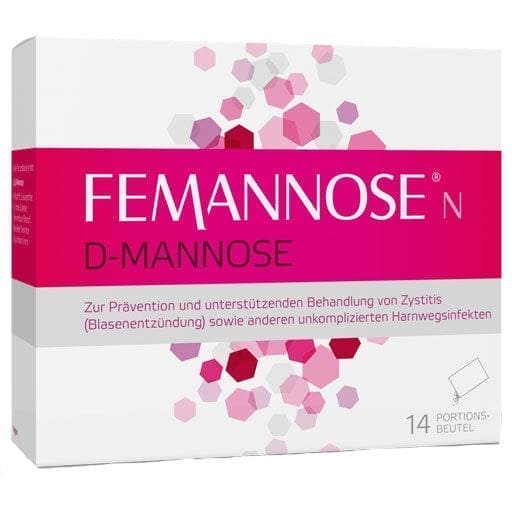MCM KLOSTERFRAU representative GmbH
Urinary tract infection, Bladder infection, FEMANNOSE N granules sachets
Urinary tract infection, Bladder infection, FEMANNOSE N granules sachets
Couldn't load pickup availability
FEMANNOSE N granules sachets, Urinary tract infection, Bladder infection
Femannose ® N
For the prevention and supportive treatment of bladder infections and uncomplicated infections of the urinary tract
Femannose ® N has the natural active ingredient D-Mannose, a simple sugar found in the body with a unique mode of action: the natural sugar ensures that the E. Coli bacteria that cause the inflammation become encased in the bladder and thereby blocked. This means that the bacteria can no longer attach themselves to the bladder mucosa and cause inflammation. Rather, they are simply flushed out the next time you go to the toilet.
Symptoms and causes of cystitis
A bladder infection is uncomfortable and affects women more often than men. The reason for this is the shorter urethra in women, which means that bacteria can get into the bladder more quickly and cause inflammation. In most cases - about 90% - the cause is the intestinal bacterium Escherichia Coli (E. Coli).
A bladder infection - also known as cystitis - shows itself through the typical symptoms such as a constant urge to urinate, burning when urinating, cloudy, unpleasant-smelling urine or abdominal pain. If there is blood in the urine, you should definitely see a doctor. Women over the age of 50 suffer particularly frequently from cystitis during menopause due to hormonal changes. But younger women between 20 and 40 are also increasingly struggling with it. Frequent sexual intercourse that irritates the mucous membranes, stress, cold feet, wet swimwear, a weakened immune system or lack of sleep all promote infection.
Prevent and treat cystitis effectively
with the delicious drinking granules Femannose ®N can be used to treat an unpleasant bladder infection, but also to prevent it effectively.
Convincing: 96% of the users are satisfied with the use of Femannose ® N - their expectations were met or even exceeded 1 .
The intake and dosage in the supportive treatment of cystitis
In the case of a bladder infection, three sachets should be taken daily up to the third day of the infection. On the fourth and fifth day, two sachets a day are enough.
In order to avoid recurring bladder infections or as a preventive measure, we recommend taking 1 sachet a day. Dissolve the drinking granules in a glass of water and then drink. Taking Femannose ®N is possible over a continuous period of thirty days.
In order to generally alleviate the symptoms of a bladder infection, it is important to drink around two liters of liquid a day to enable the pathogens to be flushed out. Heat can relieve pain in the lower abdomen and also promote blood circulation. Rest and sleep strengthen the immune system.
If there is no noticeable improvement within 3 days, a doctor should be consulted.
Other tips for preventing bladder infections
• Change wet clothing quickly after swimming
• Don't suppress the urge to urinate, go to the toilet immediately
• Don't irritate the intimate area with excessive hygiene so that the protective acid layer of the mucous membrane remains intact
• Urinate promptly after every sexual intercourse
Urinary tract infection, Bladder infection Femannose ® N
• D-Mannose with a unique active principle
• D-Mannose blocks E. coli bacteria in the bladder
• Antibiotic-free and very well tolerated
• Can also be used during pregnancy and breastfeeding after consultation with the doctor become
• for adults and children over 14 years
• natural and vegan; free from sucrose, gluten, lactose and preservatives
• Femannose ® N is available in pack sizes of 14, 30 and 2x30 sachets.
Urinary tract infection, Bladder infection FAQ
How do I recognize a urinary tract infection?
The urinary tract literally describes the path that urine takes from the kidneys to the point of excretion at the urinary opening. Urinary tract infections usually start from the outside in. The first stage is the inflammation of the inner tissue of the urethra, which leads from the urinary opening to the bladder. The symptoms are similar to those of a bladder infection: a strong urge to urinate, when urinating and also at rest there is a burning sensation, accompanied by pain in the lower abdomen, in women there may also be a discharge.
How do I recognize a bladder infection?
In the case of a bladder infection, the pathogens have reached the bladder from the outside via the urethra. Due to the inflammation, the bladder sends the signal to urinate more often: frequent urge to urinate is one of the classic symptoms of cystitis. Only a small amount of urine is excreted each time, accompanied by burning and pain that can spread cramp-like to the lower abdomen. The urine can be cloudy or even contain blood, with even small amounts causing a reddish tinge.
How can I prevent a bladder infection?
The main cause of bladder infections are E. coli bacteria from the intestines, which enter the body from the outside. To avoid this, the following preventive measures should be observed:
1) The anus and urinary opening are close together in women. To ensure that no germs from the intestine reach the urinary opening, always clean and dry the anus backwards towards the back, especially after a bowel movement. 2) Urinate no
later than 15 minutes after sex 3) To ensure that the natural flora of the mucous membrane remains intact, use fragrance-free shower gel or pH-neutral intimate lotion for cleaning if possible 4) Always drink enough: This is good for the entire organism and continuously flushes the urinary tract through – so fewer bacteria can nest. From what age can Femannose ® N be used? Femannose ® N is for adults and children over 14 years.
Does D-Mannose pose a risk for diabetics?
Since D-Mannose is hardly metabolized, diabetics can also take D-Mannose. Most of the D-mannose enters the blood unchanged, is excreted via the kidneys and thus enters the bladder and urinary tract.
Are there interactions (e.g. with painkillers, birth control pills)?
There are no interactions with medicines such as painkillers or hormonal contraceptives (“the pill”). Other drugs are not affected by D-Mannose in the body either. For products such as dietary supplements, an interval of 2 hours should be observed when taking them.
Are there any side effects?
At the dosage necessary for supportive care, no side effects have been identified, except for individual intolerance, which can result in nausea, gas, and loose stools.
1 Yougov 2018 – Report for MCM Klosterfrau Vertriebsgesellschaft mbH; User survey on Femannose ® N
Materials
Materials
Shipping & Returns
Shipping & Returns
Dimensions
Dimensions
Care Instructions
Care Instructions






